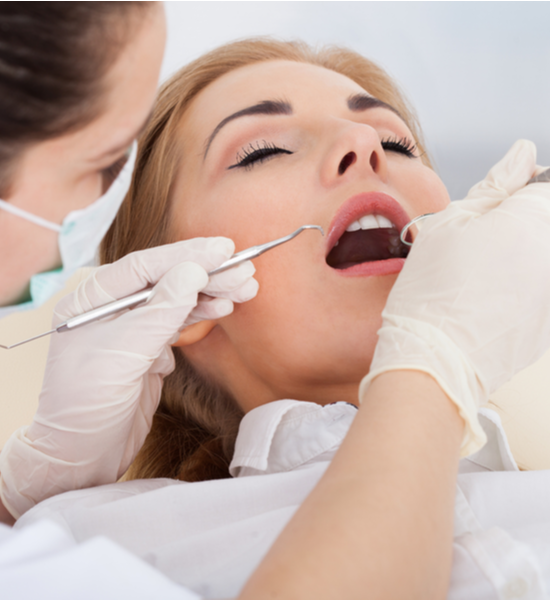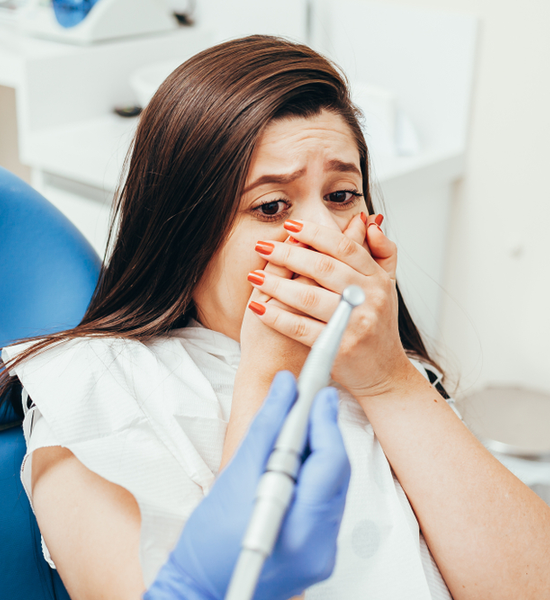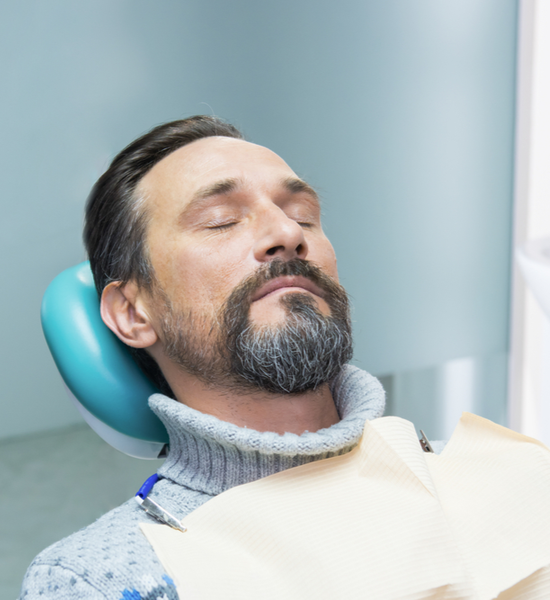Wheeling – (847) 808-8300 | Lake In The Hills – (847) 854-0525
Sedation Dentistry in Wheeling IL | Aristo Dental
Schedule Appointment
By submitting this form, you are agreeing to our privacy policy
Dental Phobia and Anxiety is Real
A significant number of Americans do not visit the dentist for regular checkups because they are too fearful or suffer from dental anxiety. Sedation dentistry offers an excellent way to provide a safe, anxiety-free, dental experience to those who are afraid of the dentist.
Sedation dentistry is often mistakenly thought to induce sleep. In fact, most sedatives allow the patient to stay awake during the procedure. Sleepiness is a side effect of some medications, but nitrous oxide, oral conscious sedation, and IV sedation only work to calm anxiety throughout the dental visit.
Sedation dentistry is popular because most sedatives can be taken by mouth, meaning no injections, no anxiety, and no pain. Some sedatives work so effectively that even the smells and details of the procedure cannot be recalled afterward. Safety and compliance are two important aspects of treatments, so sedation dentistry offers both the individual and the dentist the best alternative.
Whatever the form of sedative, it is essential to be accompanied by a caregiver. Sometimes, sedatives are provided the night before the dental visit, which means that driving to or from the appointment is not advisable.


Here are some advantages associated with sedation dentistry:
- Anxiety is alleviated.
- Few side effects.
- More can be accomplished during each visit.
- No needles.
- No pain.
- Perfectly safe.
How can one overcome Dental Phobia?
Dental anxiety and fear can become completely overwhelming. It is estimated that as many as 35 million people do not visit the dental office at all because they are too afraid. Receiving regular dental check-ups and cleanings is incredibly important. Having regular routine check-ups is the easiest way to maintain excellent oral hygiene and reduce the need for more complex treatments.
Here are some tips to help reduce dental fear and anxiety:
Talk to the dentist – The dentist is not a mind reader. Though it can be hard to talk about irrational fears with a stranger, the dentist can take extra precautions during visits if fears and anxiety are communicated.
Bring a portable music player – Music acts as a relaxant and also drowns out any fear-producing noises. Listening to calming music throughout the appointment will help to reduce anxiety.
Agree on a signal – Many people are afraid that the dentist will not know they are in significant pain during the appointment and will carry on the procedure regardless. The best way to solve this problem is to agree on a “stop” hand signal with the dentist. Both parties can easily understand signals like raising the hand or tapping on the chair.
Spray the throat – Throat sprays (for example, Vicks® Chloraseptic® Throat Spray) can actually control the gag reflex. Two or three sprays will usually keep the reflex under control for about an hour.
Take a mirror – Not being able to see what is happening can increase anxiety and make the imagination run wild. Watching the procedure can help keep reality at the forefront of the mind.
Sedation – If there is no other way to cope, sedation offers an excellent option for many people. There are several types of sedation, but the general premise behind them is the same: the patient regains their faculties after treatment is complete.
Ask about alternatives – Advances in technology mean that dental microsurgery is now an option. Lasers can be used to prepare teeth for fillings, whiten teeth and remove staining. Discuss all the options with the dentist and decide on one that is effective and produces minimal anxiety.
If you have questions or concerns about how the dentist can help you overcome anxiety and fear, please contact the office.
Contact Aristo Dental today and also ask about our Dental Sedation procedures for dental phobia.


What kinds of sedatives are available?
The most popular types of dental sedatives are nitrous oxide, oral conscious sedation, and IV sedation. Different levels of sedation (mild, moderate, and deep) can be utilized depending on individual needs. Before administering any sedative, the dentist must analyze the full medical history of the patient, as well as taking note of any current medications.
Here is an overview of some of the most common types of dental sedatives:
Nitrous Oxide
Nitrous oxide, or “laughing gas,” is used as a mild sedative. It is delivered through a nose hood, and is administered throughout the entire procedure. Nitrous oxide elevates the general mood and can evoke a general sense of well-being. Most importantly, it relieves anxiety and reduces pain during the procedure. In addition, some tingling and numbness may be felt. There are few side effects associated with nitrous oxide, and it has been safely used in dentistry for many years.
Oral Conscious Sedation
Oral conscious sedation is an excellent choice for people who fear needles. Oral medication is provided prior to treatment in order to induce a moderate state of sedation. Though oral sedatives do not cause sleep, they usually dull the senses. This means that most patients cannot remember the pain, smells or noises associated with the procedure. Usually, a dose of medication is taken prior to the appointment and then topped up during the procedure as required.
What types of drugs are used in oral conscious sedation?
Most of the drugs used in sedation dentistry are classified as benzodiazepines. Benzodiazepines reduce anxiety, muscle spasms, insomnia, and seizures. Each medication has a different half-life, meaning that the effects last for varying amounts of time. The estimated length of the procedure determines which type of drug is going to be most effective.
Here are some of the most common drugs used in oral conscious sedation:
Valium® – This sedative has amnesic properties and a long half-life. It is usually used for time-consuming, complex procedures.
Halcion® – Usually used to treat insomnia, Halcion is an effective sedative with amnesic properties. A short half-life makes this sedative useful for shorter procedures.
Ativan® – This sedative is best known for reducing anxiety. It has amnesic properties and a medium half-life. Ativan is typically used for treatments shorter than two hours.
Versed® – This sedative has the shortest half-life and is, therefore, less commonly used. It alleviates anxiety in much the same way as nitrous oxide and is used for visits that will take less than 30 minutes.
If you have questions or concerns about sedation dentistry, please contact Aristo Dental today.

Make Your Appointment Today at Aristo Dental in Wheeling
Start on your way to a better smile by calling 847-808-8300 today for an appointment. We’re also happy to answer any questions you may have – our team at Aristo Dental in Wheeling, IL is here to make your dental experience pleasant, affordable, and beautifully effective.
